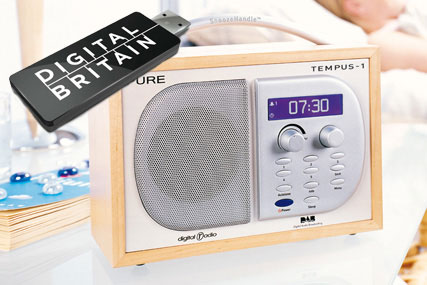
The proportion of radio listening via digital platforms is up 15% in the first three months of 2010, and 19% year on year, to command 24% of all listening.
Weekly reach of digital radio is up 15% year on year to 38.5%. This means that 43% of radio listeners are tuning in to digital on a weekly basis.
There has been growth across all platforms with DAB now accounting for more than 15% of all listening, up 10% quarter-on-quarter and 20% year-on-year.
Listening via the internet was up 29% compared to the first quarter of 2010, while DTV was up 19% year on year.
The BBC's public service broadcasting achieved the biggest rise in digital listening, up 22% to 24.6%.
The BBC's digital radio station 6 Music, due to be closed at the end of next year, achieved a near 50% rise in its audience to hit one million listeners.
Commercial radio digital listening was up 17% to 22.9% year on year.
Meanwhile, 35% of the population now live in a DAB household, according to MORI/RSMB data, a rise of 9% year-on-year.
Some 11 million digital radios are reported to have been sold and, with digital now accounting for three quarters of portable radio sales, this has led to the growth of in-home digital listening which is up 23% year on year to 30.9%.
At work digital listening also showed a significant rise up 20% year on year to 20.1%.
Ford Ennals, chief executive of industry body Digital Radio UK, said: "These are extremely encouraging results and represent a real milestone in the UK's transition to a digital future for radio.
"Over 40% of listeners now listen to digital radio every week and digital radio's share of listening is almost a quarter."
Last June, the Labour , in its controversial Digital Britain report.
Digital Radio UK's mission is to prepare the UK for the digital radio upgrade by working with the radio industry, Government and Ofcom.
Sean Duffy, head of technology, media and telecoms at Barclays Corporate, noted that the decision by the BBC to cut digital stations such as 6 Music from its network "fly in the face of increasing audience numbers", and noted that new technologies are "clearly making popular shows increasingly more accessible".
However, he added: "While growing swiftly, digital penetration still stands at around 20%, so it will be interesting to see whether the new Government will still support a digital switch over that is now only five years away."



.jpg)


.jpg)